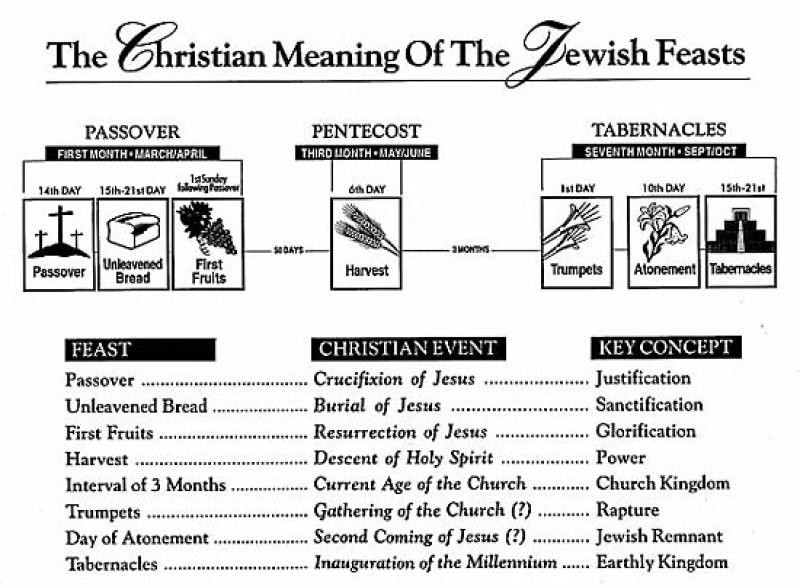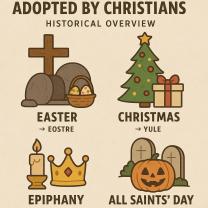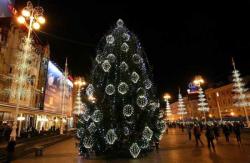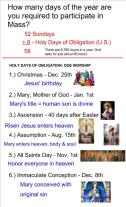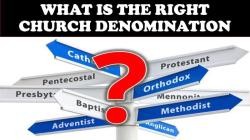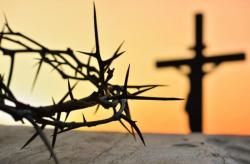What are important feast days of the Roman Catholic Church?
The Roman Catholic Church observes a liturgical calendar that includes a variety of feast days, solemnities, and commemorations throughout the year. These celebrations honor significant events in the life of Jesus Christ, the Blessed Virgin Mary, and various saints. The liturgical calendar is organized into different seasons, each with its own themes and focus. Here are some important feast days observed by the Roman Catholic Church:
Solemnity of Mary, Mother of God (January 1):
- Commemorates the role of Mary as the mother of Jesus. It is observed on New Year's Day.
Epiphany (January 6):
- Celebrates the manifestation of Jesus Christ to the Gentiles, represented by the visit of the Magi (Three Wise Men).
Feast of the Presentation of the Lord (Candlemas) (February 2):
- Commemorates the presentation of Jesus in the Temple and the ritual purification of Mary.
Ash Wednesday (Date varies):
- Marks the beginning of Lent, a season of penance and reflection, with the imposition of ashes on the foreheads of the faithful.
Solemnity of St. Joseph (March 19):
- Honors St. Joseph, the earthly father of Jesus and the husband of the Blessed Virgin Mary.
Annunciation (March 25):
- Celebrates the announcement by the angel Gabriel to the Virgin Mary that she would conceive and become the mother of Jesus.
Good Friday (Date varies):
- Commemorates the crucifixion and death of Jesus Christ.
Easter Vigil and Easter Sunday (Date varies):
- Celebrates the resurrection of Jesus from the dead. Easter is the most significant feast in the Christian calendar.
Feast of Divine Mercy (Second Sunday of Easter):
- Emphasizes the mercy of God, particularly in relation to the devotion promoted by St. Faustina Kowalska.
Ascension of the Lord (40 days after Easter):
- Commemorates the ascension of Jesus into heaven.
Pentecost (50 days after Easter):
- Celebrates the descent of the Holy Spirit upon the apostles.
Feast of the Most Holy Trinity (Sunday after Pentecost):
- Honors the Holy Trinity: Father, Son, and Holy Spirit.
Corpus Christi (Thursday after Trinity Sunday):
- Celebrates the real presence of the body and blood of Jesus Christ in the Eucharist.
Solemnity of the Sacred Heart of Jesus (Friday after Corpus Christi):
- Focuses on devotion to the Sacred Heart of Jesus, symbolizing Christ's love and compassion.
Assumption of the Blessed Virgin Mary (August 15):
- Commemorates the belief that Mary was taken body and soul into heaven.
Feast of the Exaltation of the Holy Cross (September 14):
- Commemorates the discovery of the True Cross by St. Helena and the dedication of the Basilica of the Holy Sepulchre in Jerusalem.
All Saints' Day (November 1):
- Honors all the saints, known and unknown, who have attained heaven.
All Souls' Day (November 2):
- Commemorates and prays for the souls of the faithful departed.
Immaculate Conception of the Blessed Virgin Mary (December 8):
- Celebrates the belief that Mary was conceived without original sin.
Christmas (December 25):
- Commemorates the birth of Jesus Christ.
These feasts and solemnities, along with other liturgical celebrations, form the rich tapestry of the Roman Catholic Church's liturgical calendar, guiding the worship and devotion of the faithful throughout the year. The specific dates of movable feasts vary each year based on the date of Easter.
A Celebration of Faith: Exploring Feast Days in the Roman Catholic Church
Feast days play a significant role in Catholic life, serving as much more than just calendar markings. They are vibrant celebrations that honor special saints, commemorate key events in Christian history, and delve into profound theological themes. Let's dive deeper into the significance of these holy days:
1. Important Feast Days:
- Christological Feasts: Christmas, Easter, Pentecost, Epiphany, Ascension, Corpus Christi – celebrate central events in the life and teachings of Jesus Christ.
- Marian Feasts: Solemnity of Mary Mother of God, Immaculate Conception, Assumption – honor the Virgin Mary and her pivotal role in salvation history.
- Saints' Feasts: St. Patrick's Day, St. Nicholas Day, All Saints' Day – commemorate the lives and legacies of significant saints, inspiring and offering models for Christian living.
- Theological Feasts: Holy Trinity Sunday, Holy Thursday, Good Friday – explore profound theological concepts and encourage deeper reflection on the mysteries of faith.
2. Honoring and Remembering:
- Saints' Feasts: Celebrate the exemplary lives of saints, highlighting their virtues and contributions to the Church. Their stories inspire Christian life and offer hope for our own spiritual journeys.
- Christological Feasts: Relive and contemplate pivotal moments in the life of Jesus, such as his birth, death, and resurrection, strengthening our faith and understanding of Christian salvation.
- Theological Feasts: Deepen our grasp of central doctrines like the Trinity or the Eucharist through celebration and reflection, enriching our theological understanding.
3. Regional and Cultural Variations:
- Local Patron Saints: Some regions or parishes have specific feast days dedicated to their patron saints, fostering local identity and fostering community spirit.
- Cultural Traditions: Certain ethnicities or cultures may have unique customs and traditions associated with specific feast days, blending faith with cultural heritage.
- Liturgical Variations: The ways in which Mass and other liturgies are celebrated on certain feast days may differ slightly depending on local traditions or regional practices.
4. Engagement and Festivities:
- Worship and Prayer: Most importantly, feast days are occasions for special prayers, devotional practices, and participation in Mass, deepening our relationship with God.
- Community Gatherings: Feasts also serve as opportunities for communal celebrations, bringing together Catholics to share meals, festivities, and traditions, strengthening social bonds within the faith community.
- Charitable Activities: Many feast days inspire acts of charity and service, reminding us to emulate the virtues of the saints or respond to Christ's message of love through active care for others.
5. Spiritual Reflection and Unity:
- Deepening Faith: Feast days provide special moments for personal reflection and contemplation on sacred mysteries, nourishing our spiritual growth and understanding of the faith.
- Unity and Connection: Celebrating together strengthens the bonds of fellowship within the Catholic community, reminding us of our shared faith and collective journey towards God.
- Renewal and Inspiration: Commemorating saints and revisiting key events in Christian history offers renewed hope, inspiration, and guidance for living faithfully in the present.
In conclusion, feast days are not merely calendar entries; they are vibrant tapestries woven with faith, celebration, and community. They bring to life the rich tapestry of the Catholic tradition, offering opportunities for spiritual growth, connection, and a renewed sense of purpose in our Christian lives.
